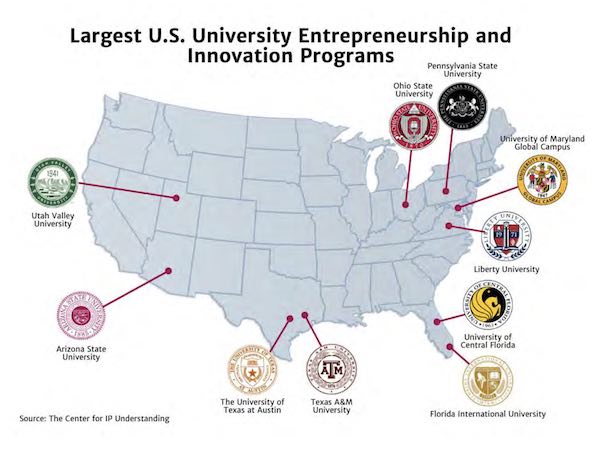“Understanding the level of IP engagement among students enrolled at these schools provides insight into ways to increase support for the nation’s would be entrepreneurs.” – CIPU report

Source: CIPU report
The Center for Intellectual Property Understanding (CIPU) has released a report that gauges the level of intellectual property (IP) engagement at the largest U.S. university entrepreneurship and innovation (E&I) programs. The nonprofit organization found that E&I programs at U.S. universities are increasingly incorporating IP into students’ business education.
The report’s goal was in part to evaluate whether the observed increase in entrepreneurship in the United States is improving engagement with or is a result of intellectual property. CIPU wrote, “understanding the level of IP engagement among students enrolled at these schools provides insight into ways to increase support for the nation’s would be entrepreneurs.”
In order to do so, CIPU evaluated the E&I programs at the top 10 U.S. universities by undergraduate enrollment during the Fall 2021 semester, as reported by U.S. News & World Report. The total number of undergraduate students attending these ten universities is 489,700, which makes them “a proving ground for the career aspirations of a great portion of America’s young adults,” according to the CIPU report.
CIPU defined “IP engagement” broadly as “an introduction to patent, trademark or trade secret matters through E&I coursework or extracurricular programming.”
The report made several conclusions about these types of programs, as well as pointing out star examples of programs that improve IP engagement. This is CIPU’s seventh installment in a series of reports on the issue of IP engagement in U.S. universities.
What Makes a Strong Program
“While the number of students obtaining IP rights for business ideas developed during undergraduate studies is currently low, there are several existing models that educators could consider to improve IP engagement and help their undergraduates identify intangible assets that help to create businesses or build meaningful careers,” wrote CIPU.
One of the main takeaways from the study is that an interdisciplinary environment is key to increasing the success of students when they graduate. Simply having a high innovation ranking was not a determining factor for students engaging in entrepreneurship and IP.
CIPU found that strong entrepreneurship programs had several defining characteristics. Strong programs often include a central hub facility that connects students with resources such as mentorship. The nonprofit also found business pitch competitions and a minor concentration in entrepreneurship at the strong entrepreneurship programs.
Another key factor was in-person learning, as this allows students to better make connections that can be useful in entrepreneurship and IP.
CIPU received significant positive feedback from multiple directors and staff members about the Blackstone LaunchPad network. The LaunchPad network develops on-campus innovation facilities and connects students with business professionals who offer mentorship and other resources. CIPU evaluated three universities that are part of the network: the University of Central Florida, Florida International University, and University of Texas at Austin.
Increasing Student Engagement with IP
One of the primary ways programs encourage interest in entrepreneurship and intellectual property is through business pitch competitions. Schools often offer a cash prize to winners.
However, CIPU argues that universities should change the prize in order to put a stronger emphasis on the importance of IP. Rather than offering a cash prize, the nonprofit says universities should offer resources to file applications for a patent, trademark, or copyright.
“If the competition can award students money dedicated to submitting a patent application, it can put them in a highly advantageous position,” UT Austin alum Krishan Sachdev told CIPU.
Although many innovations made at universities will be assigned to the school, CIPU still found interesting examples of ways to work within these constraints while still providing students with an understanding of commercial IP.
CIPU highlighted the OnRamp program at Ohio State University’s Fisher College of Business, which allows students to gain experience in innovation while starting their career path in corporate innovation. The OnRamp program relies on corporate sponsorship, a model that CIPU argues should be implemented in more universities.
Student Experiences
In order to gain a fuller picture of the IP landscape at universities, CIPU also conducted interviews with former and current students. Several students offered positive feedback on the entrepreneurship programs they attended, and alumni reported that they used what they learned about IP in a variety of fields, including medicine, law, commercial app development, and more.
Anthony Mango, a 2019 graduate of Ohio State University, said, “My idea of patents was very limited going into college. My exposure [to IP rights] during my undergraduate studies helped me slowly pick up the skill of how to navigate that world.”
Mango now works with startups in the medical device field to identify investment opportunities and he leads Orlando Health’s internal innovation accelerator.
Throughout the student interviews, CIPU noted that while some students made the choice to attend the program due to its emphasis on IP and entrepreneurship, some students reported that they were unaware of the importance of IP before taking the program. The report underlines this gap in awareness as an important one to bridge for institutions looking to promote entrepreneurship and understanding of IP.

![[IPWatchdog Logo]](https://ipwatchdog.com/wp-content/themes/IPWatchdog%20-%202023/assets/images/temp/logo-small@2x.png)

![[Advertisement]](https://ipwatchdog.com/wp-content/uploads/2024/04/UnitedLex-May-2-2024-sidebar-700x500-1.jpg)
![[Advertisement]](https://ipwatchdog.com/wp-content/uploads/2024/04/Artificial-Intelligence-2024-REPLAY-sidebar-700x500-corrected.jpg)
![[Advertisement]](https://ipwatchdog.com/wp-content/uploads/2024/04/Patent-Litigation-Masters-2024-sidebar-700x500-1.jpg)

![[Advertisement]](https://ipwatchdog.com/wp-content/uploads/2021/12/WEBINAR-336-x-280-px.png)
![[Advertisement]](https://ipwatchdog.com/wp-content/uploads/2021/12/2021-Patent-Practice-on-Demand-recorded-Feb-2021-336-x-280.jpg)
![[Advertisement]](https://ipwatchdog.com/wp-content/uploads/2021/12/Ad-4-The-Invent-Patent-System™.png)






Join the Discussion
2 comments so far.
Pierce Mooney
September 12, 2023 11:29 amAs a graduate of the UCF Business Incubator Program, my company had loads of resources, networking, and contracting opportunities to help us grow through the years. Nearly 100 Electrical Engineering and Computer Science students interned with us.
Anon
September 6, 2023 12:58 pmBravo – more of this.